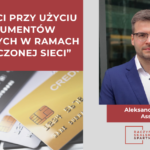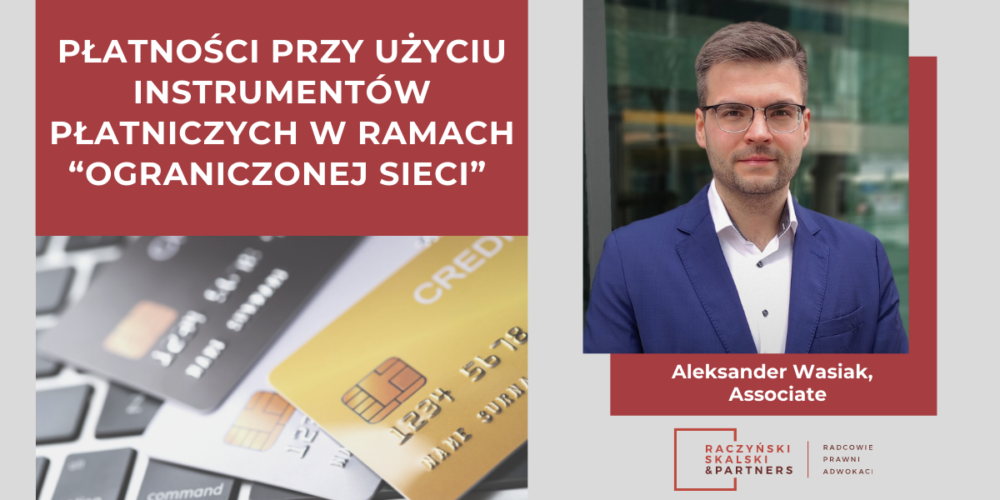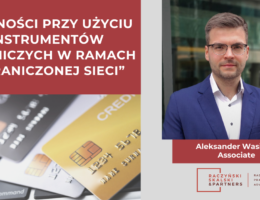The Payment Services Act of August 19, 2011 (hereinafter “PSA”) sets out, among other things, the rules for the provision of payment services and the issuance of electronic money by payment service providers (banks, national payment institutions, small payment institutions, etc.). The business activity of providing payment services (listed in Article 3(1) of the PSA) is a regulated activity and conducted in the Republic of Poland under the supervision of the Financial Supervision Commission. The provision of payment services requires an appropriate authorization or entry in a register maintained by the supervisory authority.
In the case of certain types of activities related to financial services in the broadest sense, the legislator provides for exemptions from the application of PSA provisions, which is undoubtedly a great convenience for entrepreneurs (given the long list of obligations with costs that are associated with the provision of payment services under the provisions of the PSA). According to Article 6 of the PSA, the provisions of this law do not apply to, among other things:
- payment transactions in the course of reliably performed collection and delivery of cash in the course of nonprofit activities, in particular the collection and disbursement of cash in public collections,
- provision of a “cash back” service (e.g., a merchant withdraws cash at the request of a customer made before payment for goods or services purchased),
- currency exchange from cash to cash without the intermediation of a payment account (stationary cantor activities, subject to the provisions of the Foreign Exchange Law),
- payment transactions carried out by a telecommunications entrepreneur, made in addition to telecommunications services to the end user, added to the charges for telecommunications services (payments made by telecoms).
The subject of this article is one of the exemptions to the application of the PSA, which is the issuance of payment instruments (hereinafter “IP”) within the so-called “limited network” (exclusively referred to in Article 6 item 11 of the PSA).
PAYMENT SERVICES LAW
The “limited network” activity consists of providing services (i.e., making payments) that are IP-based (i.e., performed by the user using IP), that can only be used in a limited manner, and that meet at least one of the following conditions:
- serve the IP holder to purchase goods or services only at the facilities of the issuer of the IP in question;
- they serve the IP holder to purchase goods or services within a limited network of entities bound by a commercial contract with the professional publisher of the IP in question;
- serve the IP holder only to acquire a very limited range of goods or services (the publisher of the IP need not be a vendor or service provider in this arrangement); and
- can only be used in a single EU member state if the IP is provided at the request of a business or public finance unit, is regulated for specific social or fiscal purposes by a national or local government authority, and is used to acquire specific goods or services from suppliers bound to the supplier by a commercial agreement.
At this point it is necessary to quote the definition of IP, according to which it is “an individualized device or a set of procedures agreed upon by the user (customer) and the supplier (in this case, the issuer of IP), used by the user to submit a payment order.” In the remainder of this paper, we will limit ourselves only to the services from para. 1-3 above.
The provision of services under the exemption in question requires compliance by the entrepreneur (hereinafter referred to as the “Supplier”) with the limits and conduct orders set forth in the PSA regulations. In the event that the total value of payment transactions performed by the Supplier during the last 12 months exceeds the equivalent of EUR 1,000,000.00, the Supplier is required to provide the FSC with a notification containing the following data and information:
- name or surname (company);
- the KRS number (if it has such a number) and TIN;
- place of residence and address or registered office and address and address of the main place of business;
- a description of the “limited network” services offered;
- indication under which exemption specified in the PSA the activity is carried out (i.e., providing the legal basis).
The notification should be provided by the Supplier within 14 days from the end of the month in which the above-mentioned amount was exceeded. In connection with the above requirement, the Provider should implement appropriate organizational solutions to monitor the value of executed payment transactions (e.g., monthly accounting reports or setting appropriate alerts in the IT system). Upon receipt of the notification and determination that the limit of payment transactions performed by the Provider has been exceeded, the Financial Supervision Commission shall enter the Provider in the register of electronic money service providers and issuers[1], more specifically, in the register of “entities performing activities specified in Article 6, paragraph 11 of the Payment Services Law (Limited Network)” (hereinafter the “Register”), within 30 days from the date of submission of the notification or its supplementation by the Provider.
If the activity of the Provider described in the notification does not meet the requirements of the PSA to provide services within a “limited network,” the FSC shall issue a decision to refuse the Provider’s entry into the Register. In such a case, the Supplier has two choices:
- may adjust the size of its operations (i.e., reduce the value of payment transactions performed) within 3 months from the date of delivery of the Financial Supervision Commission’s refusal decision and carry on its business as usual;
- may submit an application to the Financial Supervision Commission for a license to operate as a domestic payment institution or an application for entry in the register of small payment institutions within 3 months from the date of delivery of the Financial Supervision Commission’s negative decision.
In the second case, the Provider may continue to operate in the territory of the Republic of Poland without the requirement to obtain a permit to operate as a national payment institution or an entry in the Register of small payment institutions until the Financial Supervision Commission considers the application (which allows business continuity). After obtaining an entry in the Register, the Provider is obliged to notify the Financial Supervision Commission of its intention to terminate its business or activity of providing services within a “limited network” and indicate the date of termination of such activity.
It is worth noting that the activity of providing services within a “limited network” can be carried out by unregulated entities (outside the FinTech industry) and those under the supervision of the Financial Supervision Commission (e.g. by a national payment institution in connection with its hybrid business). Currently, five Providers are listed in the Register and include mPay S.A., based in Warsaw, SkyCash Poland S.A., based in Warsaw, and mytaxi Polska Sp. z o.o., based in Warsaw.
COMMUNICATION FROM THE FINANCIAL SUPERVISION COMMISSION REGARDING THE “LIMITED NETWORK”
On December 24, 2018, the Financial Supervision Commission issued a “Communiqué on the exemption from Article 6(11) of the Payment Services Act”[2] (hereinafter the “Communiqué”). The Communiqué contains a number of valuable clarifications regarding the practice of Providers providing services within a “limited network.”
1. Designations of the term IP
According to the Communiqué, IP can be, in particular: payment cards, debit cards, credit cards, prepaid cards, various types of virtual cards or mobile applications that have the functionality to initiate payment transactions (as long as the Provider issuing such application comes into possession of the funds that are the subject of the transaction).
2. Use of IP to submit a payment order
According to the Communiqué, an example of the use of IP to place a payment order is payment using a payment card, involving the payer (the Provider’s customer) bringing his or her payment card (IP) close to a payment terminal activated by the payee (e.g., a merchant at a stationary store) and possibly authorizing the transaction by the payer entering a PIN.
3. IP used to purchase goods or services exclusively at the Supplier’s facilities
According to the Communiqué, the exemption from Article 6(11)(a) of the PSA applies to situations in which IP is issued by a Supplier to enable its customers to make payments for products or services offered by the Supplier at its establishments. An example would be the issuance by a supermarket chain operator of a prepaid payment card that can be used to make payments for goods only at stores belonging to the chain. The establishment of the Supplier in the present case should be understood as an organizationally separate part of the Supplier’s enterprise (issuer of IP) for the sale (distribution) of services or goods (e.g., a store, gas station, repair store).
4. the IP is used only within a limited network of suppliers of goods and services, bound by a commercial contract directly with the Supplier
According to the Communiqué, this exemption applies to situations where the Supplier is an entity whose business is the issuance of IP (it is a professional issuer of IP), and the issued IP is used for payments for goods or services purchased from a specific and limited range of merchants or service providers, who are therefore bound to the Supplier by a commercial agreement (there are therefore three parties in this arrangement – the user, the Supplier and the merchant). An example would be gift cards used for payment at specific stores or service outlets (e.g., within a single shopping center), whose operators have commercial agreements with the Supplier to recognize these cards for payment.
5. IP is used only for the acquisition of a very limited range of goods or services
According to the Communiqué, the phrase “very limited scope of goods or services” used in this exemption should be interpreted as a scope that has limits, i.e., a closed, countable set of goods and services, within which there is a small number (as a rule, a few) of elements, with each case requiring individual evaluation against the criterion indicated above. Examples include fuel cards that allow only the purchase of fuel and operating fluids for cars and the payment of tolls on toll highways, or transportation cards.
According to the Dictionary of the Polish Language, “several” is a pronoun that roughly means a number equal to at least two and at most ten. In practice, it is considered that it should be no more than nine goods or services.
6. Enumeration of the value of payment transactions performed by the Supplier
According to the Communiqué, the transaction value threshold set by the legislator, at €1 million, should be referred to the value of all payment transactions performed in total under each category of exemption specified in Article 6(11) of the PSA, i.e. separately for the case specified in paragraph (a) and paragraph (b) of that provision, and not, for example, to the value of payment transactions performed using only one type of product (IP). In addition, if a given Provider issues several types of IP (e.g., prepaid cards, gift cards and virtual payment instruments,) when calculating the total value of transactions, it should add up the values of transactions performed with each type of these IP.
7. Notification to be submitted to the Financial Supervisory Commission.
According to the Communiqué, the notification must be submitted to the Financial Supervision Commission in writing (signed, by name, by persons authorized to represent the entity in question, indicating the function performed by such persons) and may be submitted:
- by means of the UKNF Electronic Submission Box (ePUAP);
- by mail to the mailing address of the Financial Supervision Commission;
- in person – at the filing office of the Financial Supervision Commission.
In addition, the Provider may use the notification form provided by the FSC[3].
8. Cases subject to application of criminal sanction
According to the Communiqué, in the event that the activity carried out by the Provider clearly violates the requirements for the activity to be considered exempt from the application of the PSA, which are set forth in Article 6 para. 11 of the PSA, the Financial Supervisory Commission may find that the Provider, while not authorized, is engaged in the business of providing payment services. Then, pursuant to Article 150(1) of the PSA, the Provider is subject to a fine of up to PLN 5 million or imprisonment for up to 2 years, or both. Moreover, according to Article 153c of the PSA, “whoever, contrary to the obligations referred to in Article 6c(1) of the PSA, fails to provide the Financial Supervisory Commission with the required information, shall be subject to a fine of up to PLN 500,000.”
This article is for informational purposes only, is not an exhaustive study of the topic and does not constitute a legal opinion or legal advice.
The next part of the article will provide a closer look at the assumptions of the draft guidelines published on July 15, 2021 by the European Financial Supervisory Authority (EBA) on conducting business within a , “limited network” (Limited Network).
If you are interested in more detailed information with regard to the scope indicated above, please feel free to contact us directly.
Aleksander Wasiak, Associate, Attorney Trainee, e-mail: aleksander.wasiak@rsplegal.pl
[1]https://e-rup.knf.gov.pl/
[2]https://www.knf.gov.pl/knf/pl/komponenty/img/Komunikat_art_6_pkt_11_ustawy_o_uslugach_platniczych.pdf
[3]https://www.knf.gov.pl/knf/pl/komponenty/img/Powiadomienie_art_6_pkt_11_ustawy_o_uslugach_platniczych.docx



